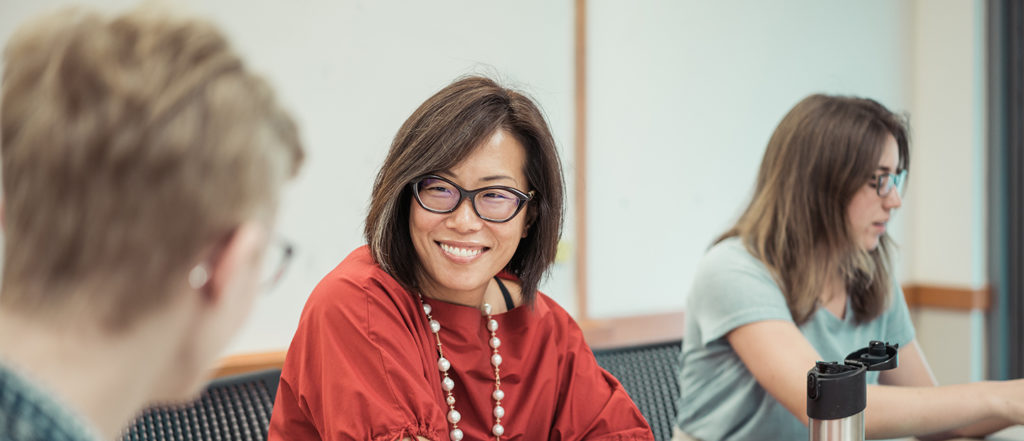Yale-NUS faculty team designs smartphone app to facilitate peer observation
 Image provided by the Yale-NUS Centre for Teaching & Learning.
Image provided by the Yale-NUS Centre for Teaching & Learning.
Since interdisciplinary learning is an integral aspect of the Yale-NUS education for both students and faculty, many faculty members regularly observe their colleagues’ classes to enhance their own knowledge of diverse fields and improve their teaching methods.
To facilitate the classroom observation, a team of Yale-NUS faculty members has received a Teaching Enhancement Grant (TEG) for the Open Classroom Project from the Centre for Development of Teaching & Learning at the National University of Singapore (NUS).
The project aims to design and implement a smart phone application to facilitate formative teaching observations by faculty members of their peers’ classes.
The project is led by Head of Studies and Associate Professor of Literature Mira Seo, alongside Assistant Professor of Psychology Jean Liu and Assistant Professor of Mathematics Matthew Stamps.
According to Assoc Prof Seo, the app will be “like Airbnb for classroom observations” in that it will allow faculty members to search the current course schedule for classes that are available to visit, and then book an observation session.
Searchable tags like “flipped classroom”, “new course”, or “senior seminar” along with the course descriptions, will allow faculty to find courses and colleagues who are interested in the same kinds of pedagogical goals and challenges, she said.
Additionally, the app will also have data metrics on the type and frequency of courses visited, which will help determine the courses and faculty who are frequent visitors or popular for visits.
“We’re hoping to expand the amount of collaboration and conversation people have about teaching by making it easier to share our teaching experiences,” Assoc Prof Seo said.
On how she came up with the idea, Assoc Prof Seo explained that observing her colleagues teach has been a “very distinctive aspect of the Yale-NUS Common Curriculum”.
“I have personally learned a tremendous amount from team teaching and discussing our teaching in the Literature and Humanities course,” she said. “Last semester, I even took a Yale-NUS class for the first time in Mathematical Logic, and I enjoyed it so much. Everyone should have the opportunity to see how much wonderful teaching is happening at the college by junior and senior faculty.”
Since she knew that she would not be able to develop the app on her own, Assoc Prof Seo reached out to colleagues with expertise in computing and statistics.
“I knew Dr Stamps had a lot of interest in the topic as he was on a peer observation task force with me, and has been involved in other informal teaching groups sponsored by the Yale-NUS Centre for Teaching & Learning. I had visited Dr Liu’s class presentations for her Better Policy Lab course, where I learned about her expertise in app-based behaviour modification, so I asked her to join the project as well,” she said.
“We also have two wonderful student associates who are working on the code and developing the app itself. Everyone has their own special skills, and I think we complement each other’s areas of expertise well.”
For Dr Liu, the idea appealed to her immediately once she heard about it.
“Over the past two years, we’ve had various roundtables to discuss how, as a college, we might learn from each other to improve our teaching methods. Amongst the faculty, many of us talked about how we appreciate sitting in on colleagues’ classes, or having others give feedback on ours. The question, however, was how to promote this kind of casual — and constant — feedback throughout the college,” she said.
“When Assoc Prof Seo suggested an app where we could visit classes as easily as booking Airbnb apartments, I jumped onto it straightaway,” Dr Liu said.
In lending her expertise in the development of the app, Dr Liu is also designing a study to examine how using it might affect faculty opinions about teaching observations and their own teaching practices.
“As a psychologist, my first instinct is to ask ‘Does this work? Does this encourage our colleagues to engage in peer observation, and do end users benefit from the feedback?’” she said.
“Basically, we’re rolling out the app with a built-in mechanism to evaluate how it fares. This is part of best practices in both education research and app development, and will contribute — we hope — to a better app.”
The app will be piloted with a small group of randomly invited users in January 2019. Subsequently, all Yale-NUS faculty will be invited to use the app in the following semester and, if all goes well, Assoc Prof Seo said she and her colleagues may try to expand use of the app to other institutions, starting with NUS.





